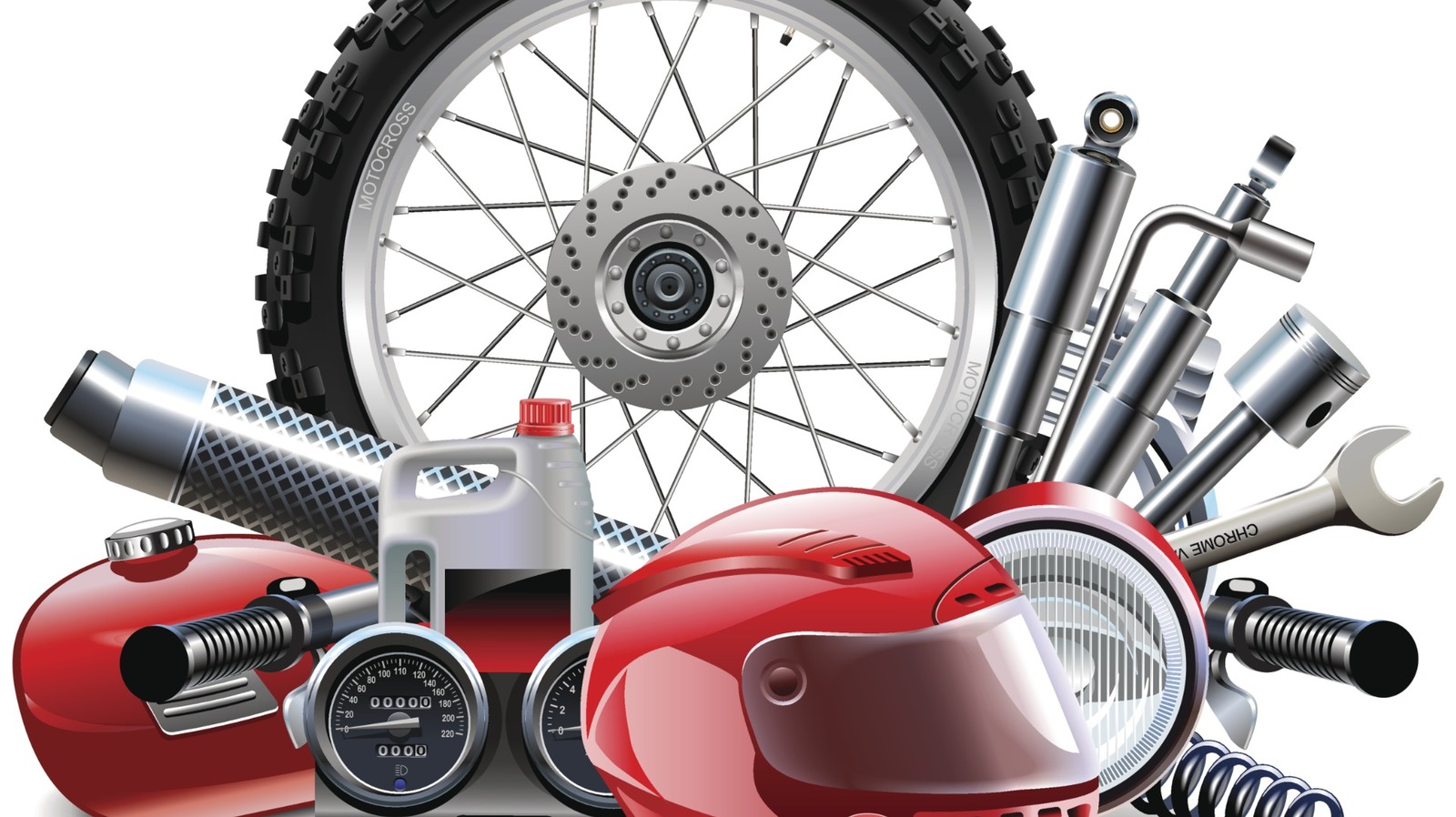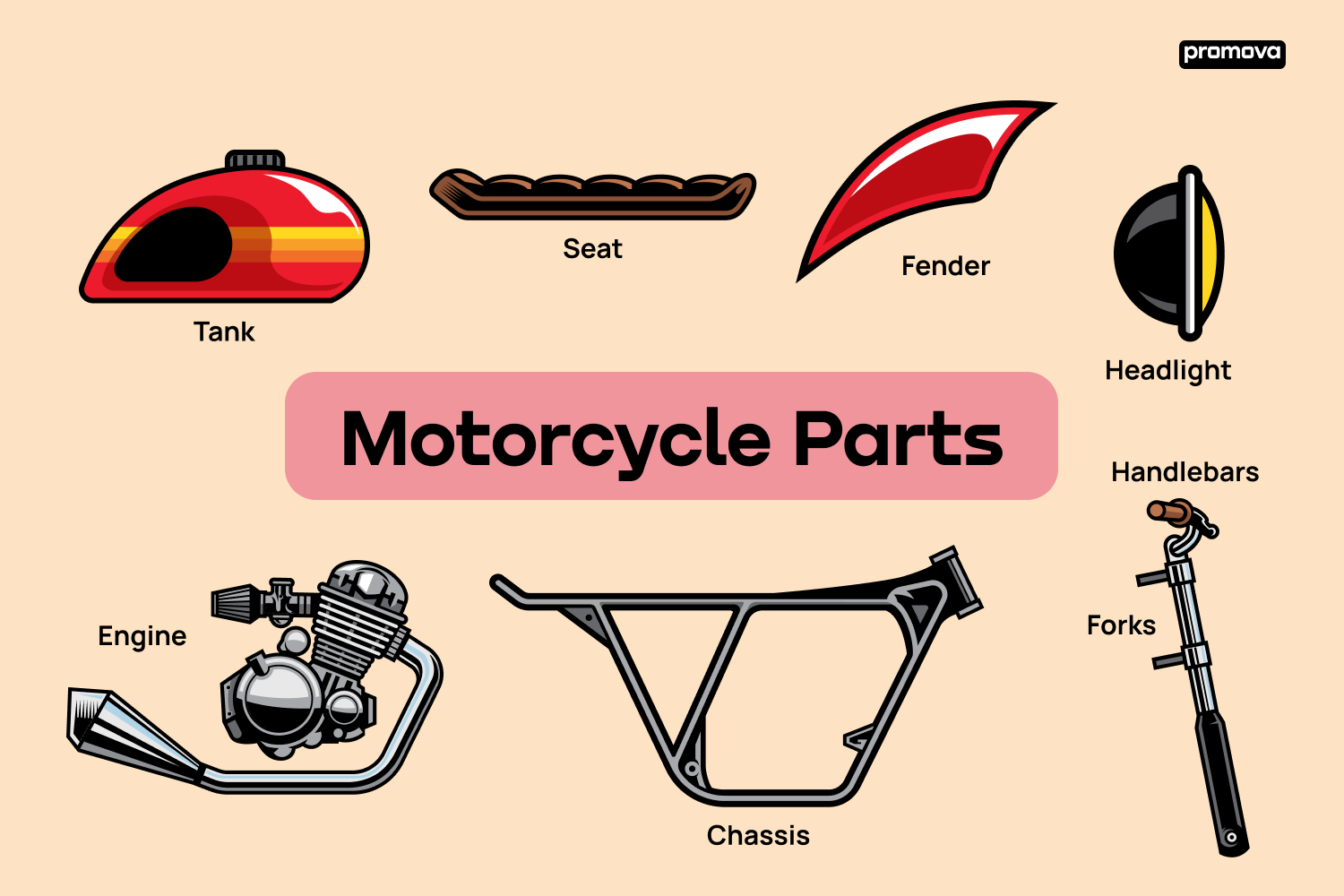FAQs Answered About Ordering Motorcycle Spares Christchurch Online
FAQs Answered About Ordering Motorcycle Spares Christchurch Online
Blog Article
Discover the Important MotorBike Parts You Required for Optimum Efficiency
Comprehending the vital parts of a motorcycle is fundamental for achieving peak performance. Each component, from the engine to the stopping system, plays a crucial duty in total capability and security. Normal maintenance can avoid unanticipated failures and enhance the riding experience. However, many motorcyclists overlook the details of these systems. Uncovering exactly how they interact can bring about a much more reliable adventure. What critical components should every motorcyclist focus on?
The Engine: The Heart of Your Bike
The engine works as the core element of a bike, driving its performance and defining its capabilities. It is accountable for converting fuel into power, which powers the bike forward. Numerous types of engines are employed, consisting of single-cylinder, V-twin, and inline configurations, each offering distinctive attributes suited for various riding designs and purposes. The engine size, usually determined in cubic centimeters (cc), considerably influences performance, with bigger engines generally giving more power and torque.Furthermore, the engine's style and innovation, such as fuel shot systems or air-cooling versus liquid-cooling, influence performance and reliability. Upkeep is essential for peak operation; aspects like regular oil adjustments and checking ignition system warranty longevity. Riders commonly think about an engine's responsiveness and level of smoothness, as these qualities improve the overall riding experience. Eventually, the engine remains a critical component that defines not just the bike's efficiency but likewise the rider's link to the equipment.
The Transmission: Shifting Gears Efficiently
The transmission plays a vital function in a motorbike's performance, particularly in the technicians of equipment shifting. Comprehending how to change gears smoothly can enhance the overall riding experience, while regular upkeep warranties peak functionality. Appropriate interest to these elements can greatly influence the long life and efficiency of the motorbike.

Gear Shifting Mechanics
Smooth equipment moving is necessary for suitable motorcycle performance, substantially influencing both acceleration and control. The technicians of gear moving involve the interaction in between the clutch, gear bar, and transmission system. When a cyclist involves the clutch, it disengages the engine from the transmission, allowing for a gear modification without harming the elements. A well-timed release of the clutch, combined with precise activity of the gear lever, facilitates a smooth adjustment in between gears. This procedure assures that the engine runs within its best power band, enhancing performance. Motorcycle Spares Christchurch. In addition, understanding the equipment ratios and their effect on rate and torque can assist cyclists make informed options during shifts, ultimately contributing to an extra delightful and receptive riding experience
Maintenance Tips Significance
Routine upkeep plays an important function in assuring that the transmission system operates successfully, permitting for smooth equipment changes. Consistently examining and transforming the transmission liquid is vital, as old fluid can result in enhanced rubbing and wear. Furthermore, examining the clutch for wear assurances peak involvement and disengagement, protecting against slippage during equipment adjustments. Lubrication of moving parts is similarly important to decrease rubbing and improve efficiency. Motorcycle proprietors must likewise keep an eye on for leakages and unusual noises, as these can show underlying concerns. By sticking to these maintenance tips, motorcyclists can prolong the life expectancy of their transmission system, assuring that gear changes stay smooth and adding to the general efficiency of their motorcycle.
The Braking System: Ensuring Security on Every Ride
Braking systems are basic elements that directly affect a motorcycle's safety and efficiency. They contain various parts, including brake pads, rotors, calipers, and hydraulic lines, all functioning together to ensure efficient slowdown. The type of braking system-- commonly either disc or drum-- influences responsiveness and quiting power.Regular maintenance is important to maintain peak performance; worn brake pads can cause lowered performance and increased stopping ranges. In addition, the top quality of brake fluid need to be monitored, as it can soak up wetness over time, jeopardizing braking efficiency.Riders should additionally take into consideration the value of anti-lock braking systems (ABS), which avoid wheel lockup throughout sudden stops, improving total security. Correctly working brakes are not nearly quiting; they impart confidence in the cyclist, permitting for more secure navigation through various terrains. Eventually, a trustworthy stopping system is essential for taking pleasure in every experience with tranquility of mind.
The Suspension: Enhancing Comfort and Control
A well-functioning shock absorber substantially adds to a motorbike's general efficiency, enhancing the performance of the stopping system. The suspension plays a considerable duty in taking in shocks from unequal surfaces, guaranteeing a smoother ride while maintaining tire call with the road. This contact is important for both stability and control, allowing riders to navigate edges with confidence and precision.Different sorts of suspension systems, such as telescopic forks or mono-shocks, provide differing levels of comfort and handling. Appropriately tuned suspension boosts responsiveness, offering the cyclist with an extra connected feeling to the motorcycle. Routine upkeep checks are vital to establish the suspension parts, including dampers and springtimes, are operating at their best. An effective suspension system not just elevates the riding experience however also adds to the long life of various other motorcycle components by minimizing damage. Consequently, purchasing quality suspension is essential for any serious motorcycle enthusiast.
The Tires: Linking You to the Road
Tires play an important duty in a motorbike's efficiency, functioning as the primary web link between the road and the rider. Understanding the different sorts of tires offered can greatly influence handling and safety and security. In addition, normal maintenance is essential to assure peak tire performance and long life.
Tire Enters Explained
Just how do different tire kinds affect a motorbike's efficiency? Tire kinds play an important role in establishing a motorcycle's stability, hold, and handling. Sport tires, designed for high performance, deal improved grip and responsiveness on smooth roadways, making them optimal for competing and hostile riding. On the other hand, touring tires focus on resilience and comfort, supplying a smoother ride for long-distance travel. Off-road tires, characterized by their tough step patterns, excel in traction on unpaved surfaces, suitable for experience fanatics. Furthermore, dual-sport tires mix attributes from both off-road and on-road categories, accommodating flexible riding demands. Eventually, picking the best tire kind is important for maximizing performance, making certain safety and security, and boosting the general riding experience.
Maintenance Tips Offered
While riding when driving, keeping suitable tire problem is essential for security and performance. Routinely examining tire stress is very important, as under-inflated tires can lead to inadequate handling and raised wear. It is advisable to inspect walk deepness regularly; used tires concession grip and stability. Additionally, motorcyclists ought to search for signs of damage, such as bulges or cracks, which can indicate the requirement for substitute. Turning tires occasionally assures even put on, improving longevity. Keeping tires tidy from particles and preventing too much curbs can prolong their life-span. Preserving correct alignment and balance contributes to come to a head efficiency, lessening stress and anxiety on various other bike elements. Following these maintenance pointers will considerably boost the overall riding experience.
The Fuel System: Sustaining Performance and Efficiency
The gas system plays an important duty in taking full advantage of a motorcycle's efficiency and performance, as it web guarantees the optimal delivery of fuel to the engine. It consists of several crucial elements, consisting of the gas storage tank, fuel pump, gas filter, and fuel injectors or carburetor. Each part should function efficiently to ensure a effective and smooth ride.The fuel storage tank stores fuel and supplies it to the engine via the fuel pump, which generates the needed pressure. A fuel filter stops pollutants from entering the engine, while the injectors or carburetor mix fuel with air for combustion.Proper upkeep of the fuel system is essential; a clogged up filter or malfunctioning injector can cause decreased performance and increased gas usage. By verifying that the gas system runs successfully, riders can delight in improved throttle response, far better fuel economic climate, and generally boosted riding experience.
The Electric System: Powering Your Trip
A reliable electrical system is essential for the general performance and safety and security of a motorcycle, as it powers vital elements such as the ignition, illumination, and different electronic systems. This system includes the battery, which shops power, and the alternator, in charge of creating power while the engine runs. The wiring harness attaches these parts, ensuring dependable power distribution.Additionally, fuses protect the system from overloads, while relays aid control high-current tools with low-power signals. A well-maintained electrical system enhances efficiency by ensuring smooth starts and constant operation of signals and lights, essential for motorcyclist exposure and safety.Regular checks of the battery's charge and links are essential for protecting against electric failings. Cyclists should additionally check wiring for damage, guaranteeing all elements function preferably. Inevitably, a durable electrical system contributes substantially to the total performance and dependability of the motorbike.
Regularly Asked Concerns
How Frequently Should I Change My Motorcycle's Battery?
The frequency of bike battery replacement relies on use and maintenance (Bike Parts Wellington). Normally, batteries must be changed every three to 5 years. Normal checks can assist identify when a substitute is necessary for peak performance
What Devices Do I Need for Standard Bike Upkeep?
For basic bike upkeep, one requires vital devices such as a socket collection, wrenches, screwdrivers, pliers, tire stress gauge, and a torque wrench. These devices assist in effective upkeep and ensure the motorbike runs efficiently and safely.
How Can I Improve My Motorbike's The rules of aerodynamics?
To enhance motorbike the rules of aerodynamics, one must consider adjusting fairings, utilizing windshield expansions, optimizing body placement, and lowering overall weight. click here to read These alterations assist decrease internet drag, boosting stability and fuel performance throughout rides.
What Are the Indications of a Failing Electrical System?
Signs of a failing electrical system consist of dimming lights, trouble starting, irregular tool analyses, and blown integrates. Motorbike Components NZ. Unusual scents or rust around battery terminals might additionally indicate underlying concerns requiring prompt focus for safety and security and efficiency

Just how Do I Pick the Right Oil for My Motorbike?
When choosing oil for a motorcycle, one should consider the maker's requirements, thickness rankings, and the kind of riding. In addition, conventional versus artificial oil can affect performance and engine protection, affecting the choice substantially. The engine dimension, typically determined in cubic centimeters (cc), considerably influences efficiency, with larger engines typically offering even more power and torque.Furthermore, the engine's layout and innovation, such as fuel shot systems or air-cooling versus liquid-cooling, affect effectiveness and dependability. A well-functioning suspension system greatly contributes to a motorcycle's total performance, matching the performance of the stopping system. The fuel system plays a crucial function in making the most of a motorbike's efficiency and performance, as it guarantees the ideal distribution of gas to the engine. A gas filter stops contaminants from entering the engine, while the injectors or carburetor mix fuel with air for combustion.Proper upkeep of the gas system is crucial; a clogged filter or malfunctioning injector can lead to reduced efficiency and increased fuel usage. A well-kept electric system enhances performance by making certain smooth beginnings and regular procedure of lights and signals, essential for biker visibility and safety.Regular checks of the battery's cost and links are essential for preventing electrical failings.
Report this page